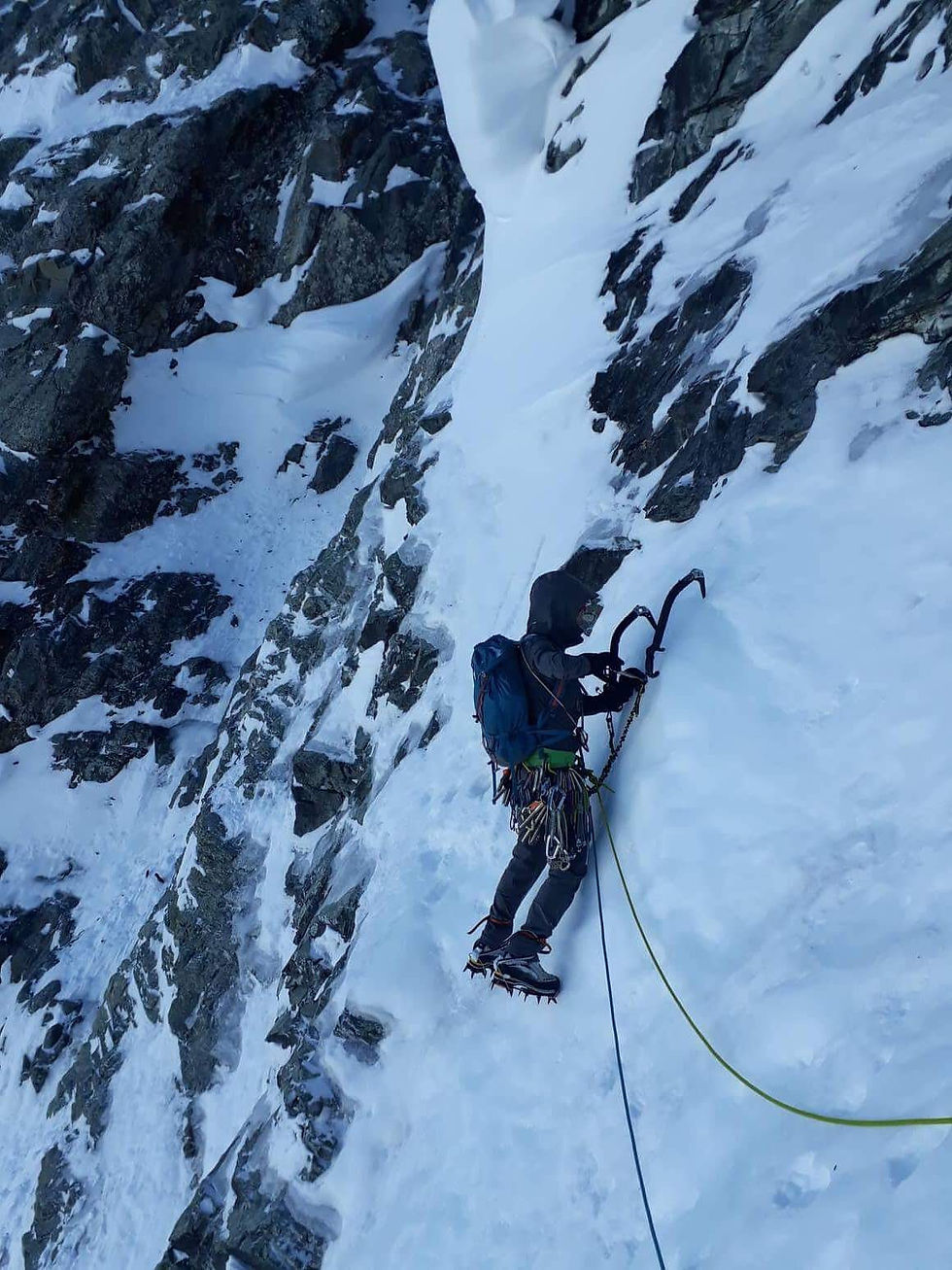Mt Hutton South Face – First Ascent
- nzalpineteam
- Aug 27, 2018
- 3 min read
Updated: Jan 7, 2024
The South Face of Mt Hutton (2820m) at the head of the Cass Valley in Tekapo received its first ascent on Sunday 26th August 2018 by three members of the New Zealand Alpine Team, Caleb Jennings, Rose Pearson and Alastair McDowell. Both the ascent and descent was illuminated by a full moon, casting a huge shadow across the face as they approached, and making headlamps unnecessary on the descent as the Southern Alps glowing around them, so they named the route ‘Moonshadow’ (MC 5+, 500m).
————————————————–
Four years ago in 2014, I spied the 500-metre tall South Face of Mt Hutton on the topo map, and discovered it was unclimbed. I recruited two adventure racing friends, we mountain biked up the Cass Valley out of Tekapo and made an attempt on the face, but we were defeated after only two time-consuming pitches up the chossy, ice-streaked face. The route was beyond my experience at the time, more than we expected or could handle. Fortunately it was only two abseils back to the ground, because I had forgotten to bring a V-threader. I managed to equalise some shallow V-threads using my ice axe as a tool. To climb technical routes like this in the future I realised I needed good mentors and a pool of more experienced climbing partners.
Since then several other parties have made attempts, mostly friends of mine, but each time they failed, repelled by sugar-snow covered greywacke lacking the crucial ice, and each time I breathed a sigh of relief. Moving to Australia made this alpine project even more inaccessible, and the face was never in condition when I returned briefly to the South Island each year. Every year the South Face of Mt Hutton haunted me.

Finally this August, I returned for a second attempt, just after the Remarkables Ice & Mixed Festival. This time I was joined by fellow NZAT members Caleb Jennings and Rose Pearson who were frothing at the prospect of a new route in their backyard, the Canterbury Alps. This time 4WD access to Memorial hut instead of mountain bikes made the 5 hour snow-plodding approach up the Faraday Glacier a much more casual affair. However, comparing photos of the face to the previous Spring-time attempt showed the face was in much leaner condition, which would make the first two pitches accessing the main face more difficult. Success was far from guaranteed.


Plugging up to the face in the ellipse of the full moon’s shadow, I set out to repeat the sketchy traverse diagonally upwards on snowy rock ledges towards the main ice gulley. Tenuous slabby moves, rotten ice and psychological protection made it a heady start to the route.
Off the belay is an exposed down-climb on small rock edges, with techy dry-tooling moves to pull around into the ice gulley, then followed by a rope length of thin ice. These desperate moves had left a deep impression when I had clawed my way through four years ago. It was rewarding to return to this spot four years later with a much deeper bag of experience in ice, mixed, rock, aid and alpine gained through the last three years of being in the NZ Alpine Team, to be able to negotiate the same moves, this time with even less ice, with much more control. It was good to see all the time spent dry tooling and scratching up the West Face of the Remarkables does pay off in the bigger mountains.

Rose took on the next two technical pitches; slow difficult leads, we watched loose rock and ice cascade down the gulley as the rope inched upwards. But in the process she had surpassed our previous high-point and we were through the hardest climbing. We were ecstatic. Every turn of the corner revealed an exciting new view of the climbing that lay above, and from this point upwards it only got better and better. Rose was then treated to an incredible 40-metre pitch of pure, fat, plastic water ice – unheard of in New Zealand!



Caleb, our packhorse from Darfield, carried the team onwards to the summit ridge, two moderate pitches and a long simul-climbing block to the top as the gradient relented. As always, the summit was still far beyond the top of the face, involving one 50m abseil and much deep snow plugging. By this point the Canterbury Alps were bathed in moon-light, a spectacular sight. Headlamps were unnecessary.
Reaching the summit revealed the mighty view west to the Aoraki/Mt Cook range, and unlike my previous climb with Caleb on Punta Herron, this time there wasn’t a breath of wind. While climbing overseas provides amazing experiences, for three Kiwi mountaineers, nothing really beats the joy of climbing a new route in your own backyard, the New Zealand Southern Alps.




Comentarios